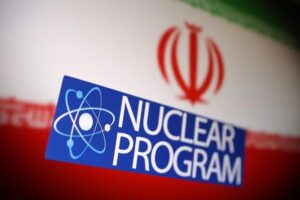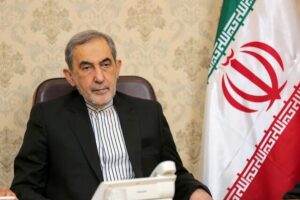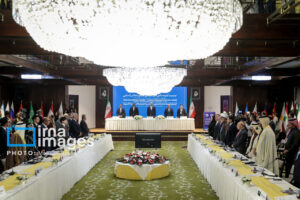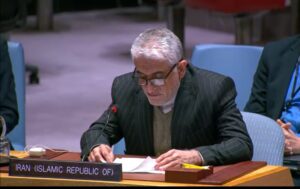Avash News: Esmaeil Baghaei, addressing a meeting titled “Diplomacy of Resistance and National Interest: Reviewing the One-Year Curriculum of the Foreign Ministry,” said that the concept of resistance is expanding and has evolved into resilience.
Noting that resistance means self-reliance, Baghaei said, “The other side resorts to international law to justify its wrongdoing, while we refer to international law to prove our righteousness. Therefore, the diplomacy of resistance must be regarded as an active tool to secure national interests.” He added that Iran is a country capable of creating waves in the international system despite having powerful enemies.
The senior official said that diplomacy is the art of aligning interests. “One of the main functions of diplomacy is recognizing opportunities and acting at the right time to align national interests with those of other countries.”
Referring to the activation of the snapback mechanism and the reinstatement of United Nations Security Council sanctions, Baghaei said that at the international level, the other side expected all countries to accept the decision immediately after the sanctions were reimposed.
On Iran’s support for regional groups, Baghaei said, “It must be considered that we did not establish the resistance groups. A proxy group is one that is created to serve your own goals. Did the issues of Palestine and Lebanon begin in 1979? These matters existed long before, and we supported them based on our upstream documents.”
The spokesman emphasized that Iran’s support for regional groups is based on a defined plan. “To prevent damage, we must create international supporters for ourselves.”
Asked why Iran did not vote for the two-state plan regarding Palestine, Baghaei referred reporters to 1947, when Resolution 181 was adopted. He said, “If you listen to the speech by Iran’s representative at that time, you will see that Iran proposed the formation of a federal government, but the Arabs opposed it. Iran’s stance has remained constant since then.”
He explained, “The two-state solution is not our issue. To form a government, three elements — land, people, and governance — are required. Which of these exists in Palestine? Ninety percent of the land is uninhabitable. What kind of government can be formed? The two-state plan is a major deceit. We have the right to express our opinion. The positions of Tunisia and Iraq are even harsher than ours.”
Referring to Iran’s consistent goodwill in its foreign policy, Baghaei said, “We condemned the September 11 attacks, and people lit candles to remember the victims. But in return, they labeled Iran as part of the ‘axis of evil.’ Regarding the nuclear issue, we never intended to create ambiguity, and the International Atomic Energy Agency was supervising our activities. Even in 2018, when the U.S. withdrew from the Joint Comprehensive Plan of Action, we remained committed to the deal.”
“Since 2019, when we began to reduce our commitments, we have given them opportunities every two months. After a few months, the Biden administration took office, and we resumed negotiations, which continued until the final stages. But they said they could not lift some of the sanctions. When Trump was in office, despite his hands being stained with the blood of our national hero, we began indirect negotiations. We were supposed to hold a meeting on June 19. All preparations were completed on Thursday night, but they attacked us on Friday.”
The spokesman added, “Under such conditions, how can we participate in a meeting set by the other side — when Israel continues its killings even after releasing captives? All in all, it was not appropriate to take part in the Sharm el-Sheikh meeting.”
The official said that the main function of a state is to ensure the security of its people. “To achieve this, we either need to build our own weapons or purchase them from others.” He said that Iran’s support for Syria was not for Bashar al-Assad personally. “In Iraq, when ISIS attacked, our national security required us to prevent the spread of danger to our borders. These supports were in line with ensuring national security.”
Speaking to students at Razavi University of Islamic Sciences in Mashhad on Wednesday, Esmaeil Baghaei said that many of the “claims made by Wendy Sherman about the snapback mechanism are false.”
According to Press TV, Wendy Ruth Sherman, a senior US nuclear negotiator during the JCPOA talks, wrote in her memoir, Fear Is Failure: Lessons on Courage, Power, and Persistence, that the inclusion of the so-called snapback mechanism — or the reinstatement of UN sanctions against Iran — was one of the final and most difficult parts of the negotiations.
Baghaei dismissed the claim, stating, “The text of the JCPOA is clear and straightforward,” and rejected assertions that Iran had been warned about the snapback mechanism.
Britain, France, and Germany triggered the so mechanism on August 28, setting in motion a 30‑day process to restore all UN sanctions on Iran.
Despite last-minute efforts by Russia and China to preserve diplomacy, the Security Council failed to reach a consensus on September 26, and two days later, the E3 and the United States declared the sanctions reinstated and urged UN member states to enforce them.
The Iranian diplomat also said that mutual distrust existed during the JCPOA negotiations, adding, “The other side did not trust us, and we did not trust them either.”
“Some claim that the snapback mechanism was imposed on us, but that is completely untrue,” he further said.
He explained that Iran’s guarantee was its own nuclear assets, while the other side wanted assurances that if Iran violated its commitments, the resolutions could be reinstated.
Baghaei said that Iran fulfilled its obligations in good faith under the JCPOA but was met with bad faith from the other party.
According to Baghaei, Resolution 2231, “based on legal and logical reasoning, has effectively ended, but Western parties insist on keeping it in force.”
Iran on Saturday declared an end to the JCPOA and all UN restrictions on its nuclear program following the expiration of Security Council resolution 2231, which endorsed the nuclear deal.
The country says its nuclear file is closed and should be treated under standard international oversight.
The diplomat added that two permanent members of the UN Security Council and countries of the Non-Aligned Movement oppose the Western interpretation, which shows “the importance and greatness of our country and our diplomatic capabilities.”
Elsewhere in his remarks, Baghaei condemned the US approach, saying, “America’s bullying behavior has disrupted international relations. Even renaming the US Department of Defense to the Department of War would better reflect its real conduct.”
He added, “The US’s aggressive unilateralism has endangered international peace and security and fostered a dangerous pattern in global relations. Through various means, including tariff wars, Washington seeks to impose dominance through coercion.”







